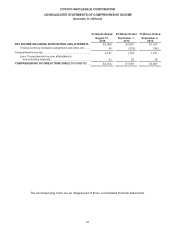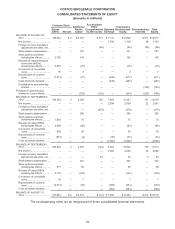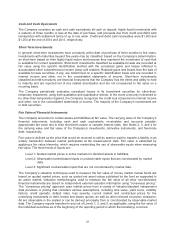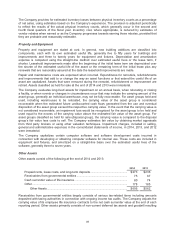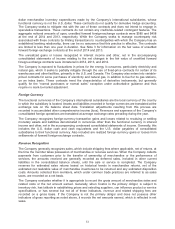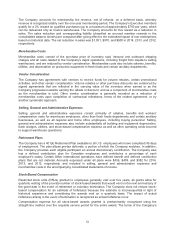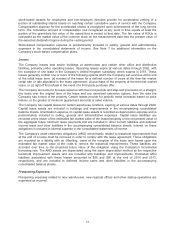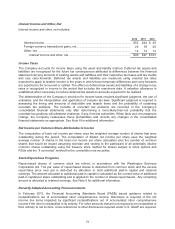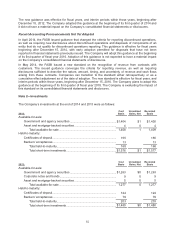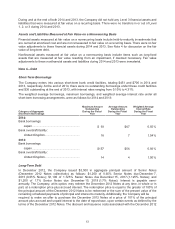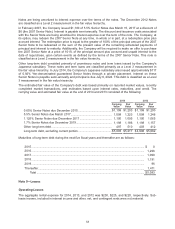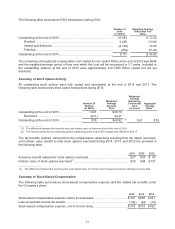Costco 2014 Annual Report Download - page 53
Download and view the complete annual report
Please find page 53 of the 2014 Costco annual report below. You can navigate through the pages in the report by either clicking on the pages listed below, or by using the keyword search tool below to find specific information within the annual report.dollar merchandise inventory expenditures made by the Company’s international subsidiaries, whose
functional currency is not the U.S. dollar. These contracts do not qualify for derivative hedge accounting.
The Company seeks to mitigate risk with the use of these contracts and does not intend to engage in
speculative transactions. These contracts do not contain any credit-risk-related contingent features. The
aggregate notional amounts of open, unsettled forward foreign-exchange contracts were $585 and $458
at the end of 2014 and 2013, respectively. While the Company seeks to manage counterparty risk
associated with these contracts by limiting transactions to counterparties with which the Company has an
established banking relationship, there can be no assurance that this practice is effective. The contracts
are limited to less than one year in duration. See Note 3 for information on the fair value of unsettled
forward foreign-exchange contracts at the end of 2014 and 2013.
The unrealized gains or losses recognized in interest income and other, net in the accompanying
consolidated statements of income relating to the net changes in the fair value of unsettled forward
foreign-exchange contracts were immaterial in 2014, 2013, and 2012.
The Company is exposed to fluctuations in prices for the energy it consumes, particularly electricity and
natural gas, which it seeks to partially mitigate through the use of fixed-price contracts for certain of its
warehouses and other facilities, primarily in the U.S. and Canada. The Company also enters into variable-
priced contracts for some purchases of electricity and natural gas, in addition to fuel for its gas stations,
on an index basis. These contracts meet the characteristics of derivative instruments, but generally
qualify for the “normal purchases or normal sales” exception under authoritative guidance and thus
require no mark-to-market adjustment.
Foreign Currency
The functional currencies of the Company’s international subsidiaries are the local currency of the country
in which the subsidiary is located. Assets and liabilities recorded in foreign currencies are translated at the
exchange rate on the balance sheet date. Translation adjustments resulting from this process are
recorded in accumulated other comprehensive income (loss). Revenues and expenses of the Company’s
consolidated foreign operations are translated at average exchange rates prevailing during the year.
The Company recognizes foreign-currency transaction gains and losses related to revaluing or settling
monetary assets and liabilities denominated in currencies other than the functional currency in interest
income and other, net in the accompanying condensed consolidated statements of income. Generally, this
includes the U.S. dollar cash and cash equivalents and the U.S. dollar payables of consolidated
subsidiaries to their functional currency. Also included are realized foreign-currency gains or losses from
settlements of forward foreign-exchange contracts.
Revenue Recognition
The Company generally recognizes sales, which include shipping fees where applicable, net of returns, at
the time the member takes possession of merchandise or receives services. When the Company collects
payments from customers prior to the transfer of ownership of merchandise or the performance of
services, the amounts received are generally recorded as deferred sales, included in other current
liabilities in the consolidated balance sheets, until the sale or service is completed. The Company
reserves for estimated sales returns based on historical trends in merchandise returns, net of the
estimated net realizable value of merchandise inventories to be returned and any estimated disposition
costs. Amounts collected from members, which under common trade practices are referred to as sales
taxes, are recorded on a net basis.
The Company evaluates whether it is appropriate to record the gross amount of merchandise sales and
related costs or the net amount earned. Generally, when Costco is the primary obligor, is subject to
inventory risk, has latitude in establishing prices and selecting suppliers, can influence product or service
specifications, or has several but not all of these indicators, revenue and related shipping fees are
recorded on a gross basis. If the Company is not the primary obligor and does not possess other
indicators of gross reporting as noted above, it records the net amounts earned, which is reflected in net
sales.
51




